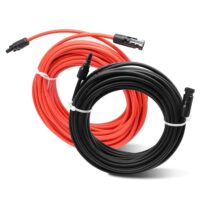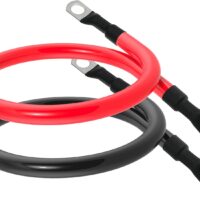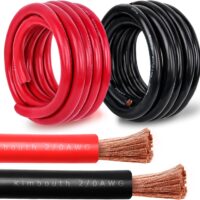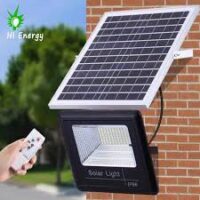Cables
Showing all 4 results
Showing all 4 results
Types of Solar Cables
- Photovoltaic (PV) Cables:
- These are the most common type of solar cables, specifically designed for connecting solar panels to inverters. They are typically single-core cables with double insulation for added protection.
- DC Cables:
- Direct Current (DC) cables are used to connect solar panels to the charge controller and batteries. They are usually thicker to handle higher current flows.
- AC Cables:
- Alternating Current (AC) cables are used to connect the inverter to the main power supply or the electrical grid. These cables handle the converted AC power from the inverter.
- Battery Cables:
- These are used in solar power systems with battery storage, connecting the batteries to the inverter and other components.
Specifications to Consider
- Conductor Material:
- Solar cables are typically made from copper or aluminum. Copper is preferred for its higher conductivity, while aluminum is lighter and cheaper but less conductive.
- Insulation Material:
- The insulation material is crucial for ensuring the cable’s durability and safety. Common insulation materials include XLPE (Cross-Linked Polyethylene) and EPR (Ethylene Propylene Rubber).
- Cable Size (Gauge):
- The gauge of the cable affects its current-carrying capacity. Larger cables can carry more current but are also thicker and harder to handle. Proper sizing is essential to minimize energy loss and ensure safety.
- Voltage Rating:
- Solar cables are rated for different voltage levels. It’s important to choose a cable that matches the voltage of your solar power system to avoid overloading and potential hazards.
Applications
- Residential Solar Power Systems:
- Used for connecting rooftop solar panels to inverters and home electrical systems.
- Commercial and Industrial Solar Installations:
- Employed in larger scale solar power plants and commercial buildings with extensive solar arrays.
- Off-Grid Solar Systems:
- Essential for remote or off-grid solar power setups, connecting various components like solar panels, batteries, and inverters.
- Solar Farms:
- Used extensively in large solar farms to connect multiple solar panels and transport the generated electricity to the grid.
Solar cables are a critical component of any solar power system, ensuring the safe and efficient transmission of electricity from solar panels to other system components. When selecting solar cables, it’s essential to consider factors such as UV resistance, weather durability, cable size, and compliance with international standards to ensure optimal performance and safety of the solar installation.






